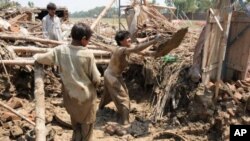The United Nations High Commissioner for Refugees says Afghan refugees who are living in flood-stricken Pakistan are among the most vulnerable victims. The UNHCR says it is assisting hundreds of thousands of Afghans whose camps are overwhelmed by flooding.
Pakistan's prime minister now says some 20 million people are affected by the worst flooding to hit the country in over a generation. This figure is much higher than the 14 million estimated by the United Nations.
In either case, the number is huge. The U.N. refugee agency is warning the enormous crisis facing Pakistan is still unfolding. Spokesman Adrian Edwards says the after effects of this catastrophe will be felt for years to come.
"There continues to be massive destruction as the bloated rivers flow southwards across the plains and the crisis, in our view, will not be over when the flooding recedes due to homelessness, hunger and illness. The rationale for our presence in Pakistan relates to the fact that it is the biggest caseload of refugees that we deal with in the world and displaced persons," he said.
At one time, the U.N. refugee agency assisted more than four million Afghan refugees in Pakistan. That number now has gone down to 1.7 million. Of them, the agency says 1.4 million reside in the worst hit areas.
Edwards says many Afghan refugees now are without shelter and have lost their food, livestock and all their possessions.
"To illustrate the problems that we are up against, in Khyber Pakhtunkhwa Province, we have now found that 78 refugee camps across 17 districts in the province are overwhelmed by flooding, erasing more than 12, 500 homes, leaving 85,500 refugees homeless. Many homes have been seriously damaged among both refugees and local Pakistanis," he said.
Edwards says his agency, in coordination with others, is providing safe temporary shelter and emergency food and medical assistance to these vulnerable homeless refugees, many of whom are women, children and elderly people.
He says the U.N. refugee agency also is helping Pakistani communities ravaged by the immediate flooding. He says the agency's humanitarian operations will continue well after the emergency phase is over.
Edwards says over the coming weeks and months, UNHCR would be helping refugee families and affected Pakistani communities to return to their homes in as dignified a manner as possible.




